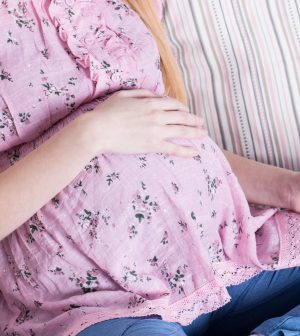- Could Your Grocery Store Meat Be Causing Recurring UTIs?
- Are You Making This Expensive Thermostat Error This Winter?
- Recognizing the Signs of Hypothyroidism
- 10 Strategies to Overcome Insomnia
- Could Artificial Sweeteners Be Aging the Brain Faster?
- Techniques for Soothing Your Nervous System
- Does the Water in Your House Smell Funny? Here’s Why
- Can a Daily Dose of Apple Cider Vinegar Actually Aid Weight Loss?
- 6 Health Beverages That Can Actually Spike Your Blood Sugar
- Treatment Options for Social Anxiety Disorder
Mom’s Mental Health in Pregnancy Could Affect That of Her Child

A pregnant woman’s mental health might have profound effects on the mind of her unborn child, a new evidence review warns.
Children appear to be at higher risk for mental health and behavior issues if their moms were highly stressed, anxious or depressed during pregnancy, researchers report.
In particular, children were more likely to have ADHD symptoms or exhibit aggressive or hostile behavior if their moms reported more anxiety, depression or stress while pregnant.
“Our research suggests that psychological distress during the pregnancy period has a small but persistent effect on children’s risk for aggressive, disinhibited and impulsive behaviors,” said researcher Irene Tung, an assistant professor of psychology at California State University, Dominguez Hills.
For the review, Tung and her colleagues pooled and analyzed data from 55 studies involving more than 45,000 participants.
All the studies measured women’s psychological distress during pregnancy, and then later measured their children’s “externalizing behaviors” — mental health symptoms directed toward others.
The researchers also included only research where the mothers’ distress was measured both during and after pregnancy, to control for the potential effects of postpartum mental health problems on developing newborns.
They found that even after controlling for mom’s postnatal distress, psychological symptoms during pregnancy independently raise children’s risk of mental health problems.
The effect held true for both boys and girls. It was strongest in early childhood (ages 2-5), but it persisted through middle childhood and the teenage years.
The findings were published online Nov. 16 in the journal Psychological Bulletin.
Theories have suggested that exposure to stress hormones while in the womb can affect children’s brain development, the researchers noted.
Tung and her colleagues are now conducting studies focused on understanding the types of support that could protect women from stress during pregnancy, particularly those in families facing health inequities.
“Most existing research has focused on white, middle-class and higher educated samples, but experiences of racism, economic disparities and lack of health care access are known contributors to stress during pregnancy,” Tung said in an journal news release. “Understanding how psychological distress during pregnancy impacts underrepresented families is key to developing equitable public health policies and interventions.”
More information
The March of Dimes has more about stress and pregnancy.
SOURCE: American Psychological Association, news release, Nov. 16, 2023
Source: HealthDay
Copyright © 2026 HealthDay. All rights reserved.










